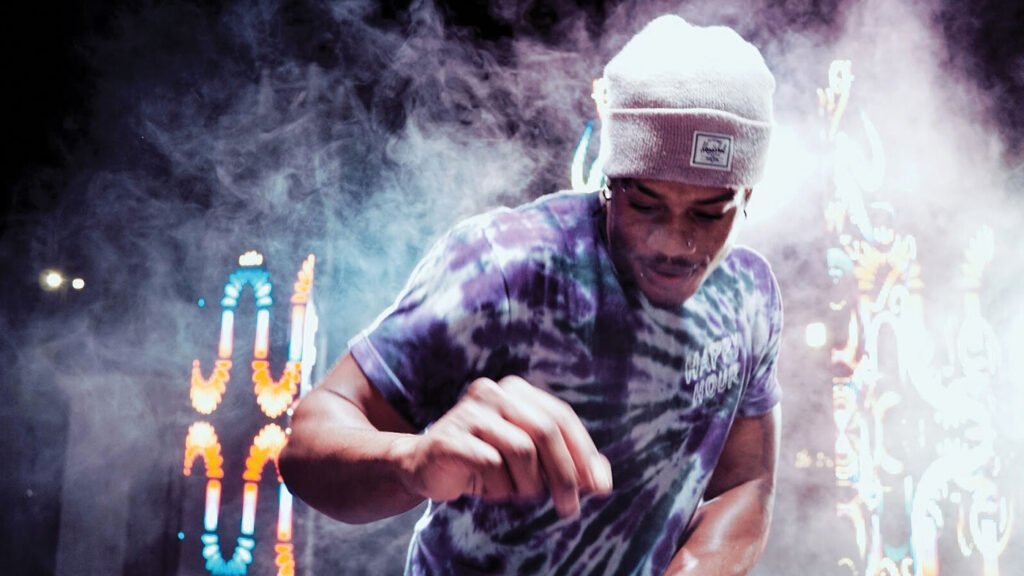“I believe in the mystical powers that vibrate through music and obliterate the ego and fear and thus serve as a portal to understanding, empathy, communion, renaissance and long term change.” Symren
Hello there Symren, keen to know if you’ve learned something post the BLM explosion about your attitude on race?
Symren: I always knew it was a significant issue, but the last few months have beaten home just how widespread this sickness still is. How accepted it still is. It’s this evil and corrosive thread that weaves its way through everything in society. I really think education in schools is so important.
Can you detail any specific events in the public sphere that have shown you ‘how widespread this sickness is?’
Symren: Obviously, there’s been the murder of George Floyd, the murder of Rayshard Brooks and with the murder of Breonna Taylor the subsequent non-indictment of the police officers. These atrocities and injustices have really brought the extent of police brutality towards black people to everyone’s attention. It’s happening all the time. I was deeply pained to see the reaction towards BLM by many who persisted in retaliating with the “All lives matter” slogan. Comprehensively missing the point and refusing to admit the gravity of the issues at the centre of the campaign. Specific sectors were waiting for a rise in infections in the summer so that BLM could be blamed. So that Black people could be accused. We live in a racist society. The mess around the Grenfell Inquiry would not be happening if the majority of the people who died had not been of colour. There are definitely a few reasons as to why Covid has affected more people of colour. Still, the most important one is clearly the socioeconomic disadvantages that the people face. You cannot ignore how crucial racial discrimination and racial inequalities in housing are. You have pompous sections of the middle class who think that racism just doesn’t exist. But we are making a change, and things will get better, but the fight must continue from everyone.
What would you say to those who believe that racism of this nature is irrelevant to the UK experience of inequality?
Symren: They don’t understand that people of colour, no matter where they live, would be deeply affected by such acts of brutality. People fail to realise that racism is a global issue. The Stephen Lawrence inquiry and the subsequent Macpherson report revealed how institutionally racist the police are in this country. We know brutality exists within the police too. Black people are more than twice as likely to die in Police custody. In August police officers knelt on Marcus Coutain’s neck. In 2017 Rashan Charles lost his life, after being restrained by a police officer and choking on a package of caffeine and paracetamol. In 2010 Jimmy Mubenga died on a plane on a Heathrow runway while being restrained by three immigration officers after saying he couldn’t breathe either. I repeat racism is a global issue.
Part of the issue stems from well-meaning white liberals who claim to be anti-racist. And yet, quiz them on what they’ve done to educate themselves beyond online media and the facts are lukewarm at best. Care to share your thoughts on any experience you have in this regard?
Symren: I’ve had experiences where people have told me that they don’t believe racism exists anymore. It’s that dangerously inaccurate belief held by many that can be so painful for those who have experienced the struggle. It aims, perhaps unintentionally, at slamming the door in the face of those who have suffered the most inhumane of injustices. The ignorance is tragic, and it’s pompous. I try not to have a significant opinion on stuff I know nothing about or haven’t experienced. In fact, an opinion isn’t really such unless it is rooted in truth.
Some people have said that if you indoctrinate a person to believe that they are the central figure in the narrative of the world, they will kick against any calling for reform. Have you experienced any recent resistance to your current viewpoints on race?
Symren: Yes, mainly around my support for the BLM marches in the summer. I received retaliations centred around the timing of them in respect to covid, and whether they were relevant in the UK. I find it quite disgusting really to pass judgement on an outpouring of emotion, stemming from centuries of trauma and persecution, and an eruption of passion for justice and change. The timing was irrelevant. The voices needed to be heard and still need to be heard. My record narrates my personal struggle, so maybe people feel like they don’t want to say anything to me about that. Racism is, of course, entrenched in fear and cowardice.
There seems to be a colonial barrier in regards to the induction of human rights issues often reframed as political by those unwilling to rethink the identity of punk rock. Why do you think that is and do you think it can be addressed via music?
Symren: It’s the aloofness, selfishness, greed and hierarchy of colonialism, corrosively weaving its way through sections of the British population that perpetuates this inability to admit or support human rights issues. If it doesn’t affect them, it doesn’t exist. “Who cares?” “It’s not our problem.” “I don’t see it”. These are the attitudes of the ignorant in Britain. Punk is about human rights. It’s a philosophy, and a way of life that encourages pure freedom and complete equality and anyone can be a punk. It’s not about the sound of your guitar. Although Punk must be political too, these human rights issues should transcend politics, but they rarely do. I believe in the mystical powers that vibrate through music and obliterate the ego and fear and thus serve as a portal to understanding, empathy, communion, renaissance and long term change.
Mystical powers? Feel free to expand on that topic?
Symren: I never used to be scared of death. I was desperate for it once, but I think I was actually invincible for a while. I died twice and was brought back from the abyss both times. I have a fear of death now. I love living too much, but contradictorily I’d be very happy to die on stage, or in the studio the moment you hear a new song exploding. In those moments, and the times you are shot away in your favourite tune, you can really abandon who you are. Your darkest experiences perish, and your essence can meander unbounded. It’s unblemished bliss. So pure, so infinite and so beautiful that reality disintegrates in a blink. So death in moments of profound connection to music is inevitable but only to espouse renaissance. It’s our Human right to be free and to perpetually change.
Is there a danger in arguably romanticising death in the context of the creative process?
Symren: Sikh Punk is about death as much as it is about renaissance. Death of your old self, death of old friends, gang-related deaths, The Jallianwala Bagh Massacre, those who tragically died in Grenfell, death from drugs, the death of capitalism, the death of human rights. But ultimately it’s about victory, renaissance, the delivery of the human spirit to the upper reaches of reality and the realm of the infinite. It’s a crusade to invoke human rights and equality and fight racism and injustice. I can’t believe that death is the end. The last words of the record are “Too young to live without desire” by Mick Jones insinuating that life is forever.
You’ve covered a lot of subjects and sub-topics on the album. Was it hard to condense your experience into one long player? Were you forced to edit anything out?
Symren: Every song in the world is a universe within itself. I’m really hoping that sharing the intimate details of my experience and commenting on specific historical, racial, social and political issues will give others, not necessarily just the south Asian diaspora, but anyone, the courage to share their truth, cast away their shame and transform their lives in the name of human freedom.
Your candid nature is precious, evidence of such is palpable upon the playthrough of the album. Indeed there was enough ideas and material left over for a continuation of your statement thus far?
Symren: Thank you very much, John. Absolutely, this is a lifelong journey, and the next record will be another opportunity to carry on this crucial work by continuing to share experience and comment on the world. So much has happened since the record was completed in April. It’s unbelievable, really. Also, Mick Jones takes us right back to the beginning at the end. But the beginning of where and as whom?
So much intrigue on this record, let alone the collaboration with Idles. How do you feel about the detractors of their music and the following chart position of national number 1?
Symren: What a phenomenal achievement. I remember my manager playing them to me over dinner at his house in late 2016. I was blown away immediately, so I was so truly honoured to work with Joe Talbot on my album. Their message is so important, so it’s a revelation having them at number one. I think I was banging on the door of a closed pub Dev apparently worked at in Bristol early in the morning in 2010. It was during an Eighties Matchbox tour trying to get a morning beer. “Let me in! Let me in!” I cried. I’m not sure how that’s relevant, but I do feel a connection with them.
Which pub? Was it The Mother’s Ruin? I associate that place with a guitarist from Bristolian megastars in waiting, St Pierre Snake Invasion. Do you have any opinions on the early mixed reviews for Ultra Mono and the subsequent triumph of the LP chart-wise?
Symren: Ah, I’m not sure! I was hanging on for dear life at the time, I could have been in the Sahara Desert, Portobello Road or Wycombe underpass and wouldn’t have known any different. I do feel connected to them in a unique way, though. I feel it emphatically. Whenever I’ve been criticised, I’ve always ultimately tried to use it to my advantage, and I’m sure they’re doing the same. You can’t really ask for a better response than a number one album. I think there’s so much great music around at the moment though. I guess the wonderful thing about the internet is that it’s opened music up in a way like never before. I don’t think I could have made this record without the inspiration of Fat Whites. I was late to get into them, but they changed my life.
Westerns critical minds (often mistaken for world consensus) are increasingly polarised in their assessment of what we need from musicians, never mind world leaders. Do you find it hard to navigate such extreme demand for a clear side to be taken in opinions such as which band represents your worldview the closest? Need we play the game the press, and the more passionate fan wants us to take part in?
Symren: Navigating the minds of the public is beyond my scope, but not beyond the velocity of music and lyrics. That kind of vibration should transcend all debate but often releasing music is like going to war.
Finally, I’d like to ask you about the importance of having your voice added to the recent retrospective summations of activism of the ’70s. Despite it not being your time of awareness due to age, how do you feel about the relationship between movements such as Rock Against Racism and today’s BLM? Unfair equivalency, or is there a patch of Venn diagram that might provoke some thought from your perspective?
Symren: I feel it my duty to stand up and share an experience of Britain from the perspective of a South Asian immigrant. It’s a story so rarely told in music or cinema. The mission is to empower, create equality and understanding and expunge the stereotype. I was honoured to play a show for Rock against Racism with The Buzzcocks and The Libertines a few years back and be a part of their campaigning. And Mick Jones was an integral part of rock against racism too, so that was another reason why it was so significant that he is featured on the album. There is a dynamic to BLM that is strategised and organised with modern-day resources. Still, the causes are both formidable and integral to justice, equality and harmony. The sad thing, I guess, is that we are still fighting for fundamental human rights.
Thank you so much for your time and consideration of these weighty questions in a complicated era. I’m sure we’ll do this again sometime.
Symren: Thank you so much, John, I always learn so much from talking to you.
Stay in touch with
Website
Facebook
Instagram
YouTube
Twitter



